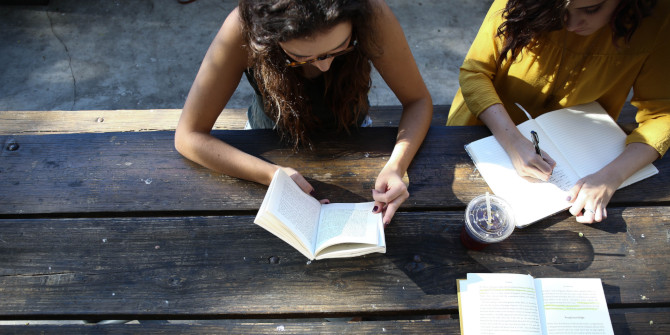Norway has an established reputation as a state that seeks to do good in the rest of the world. But how well does this reputation as a humanitarian actor match the country’s actions? Antoine de Bengy Puyvallée argues Norway’s approach to the Covid-19 pandemic provides a useful illustration of the paradoxes that lie at the heart of its national brand.
Norway likes to see itself and is often described as a ‘humanitarian superpower’. In a newly published volume that I co-edited with Kristian Bjørkdahl, Do Gooders at the End of Aid, we argue that the humanitarian political culture infusing Norway’s national identity and the country’s international reputation as a vocal advocate for solidarity can be usefully analysed as a national brand.
Norway’s humanitarian brand, we argue, is not only an interesting construct to unpack in itself. It can also be analysed as an asset used strategically by policymakers through branding practices to legitimise ideas, projects and policies abroad, as well as advance commercial, diplomatic and security interests in the name of ‘humanitarianism’. Such branding practices have been on full force during the Covid-19 pandemic, when Norway has been one of the most vocal proponents of global solidarity in a diplomatic context marked by the rise of nationalism and unilateralism.
Norway, global leader in the global response to Covid-19
Norway’s activism in the global fight against Covid-19 builds on the country’s long-standing reputation as a vocal advocate of global solidarity and collaboration in global health. Norway played a leading role in the pandemic response by co-chairing, with South Africa, the Access to Covid-19 Tools Accelerator (ACT-A). This global initiative raised over 18 billion US dollars to develop and ensure equitable access to vaccines, diagnostics and treatments against Covid-19.
At his appointment as co-chair of ACT-A, the Norwegian Minister of Development, Dag Inge Ulstein, commented that “Norway is a small country, but it is clear that our engagement in this area has been noticed […] Taking on this important role is therefore completely in line with Norway’s efforts to fight poverty”. This statement is a good illustration of Norway’s international reputation-building as a ‘humanitarian superpower’ and this, in turn, can prove a useful asset to reap diplomatic benefits and gain status and influence.
Branding charity in times of ‘vaccine apartheid’
The idea of solidarity with the world and the moral obligation to help fight the pandemic globally has rallied wide popular support in Norway. This humanitarian impulse legitimised the government’s spending of millions of euros to the global Covid-19 response without public controversy – making Norway one of the world’s most generous donors per capita.
The outgoing Norwegian Minister of Health, Bent Høie, has branded this generosity as exceptional in the international context, claiming that the global situation would look “very different” if all countries did as much as Norway to get vaccines to other countries. This branding strategy has successfully framed Norway’s financial contribution as virtuous in and of itself.
In so doing, the Minister of Health effectively decoupled the act of doing good from the broader context – the stark inequality in access to Covid-19 vaccines to which Norway and other wealthy countries have directly contributed by jumping to the front of the vaccine queue and securing priority access to doses. The result? Norway has fully vaccinated 86% of its adult population, while only 2.7% of people in low-income countries have received one vaccine dose. As argued elsewhere, Norway took with one hand what it gave with the other and was not particularly exceptional in its global response to the virus.
Paradoxically, an opinion poll published in February this year showed that 82% of Norwegians thought it was unacceptable that rich countries have paid large sums of money to get priority access to vaccines. Yet, despite this moral stance, there has been no public outcry in Norway about the government doing precisely this. To the contrary, authorities have received wide praise for their handling of the pandemic.
The resilience of the Norwegian (and Scandinavian) humanitarian brand
Interestingly, the gap between the rhetoric of solidarity and the reality of gross inequality does not seem to have called the Norwegian humanitarian brand into question – which continues to ‘stick’ both at home and abroad. In our book, we explore the mechanisms fostering such resilience, including the fact that the identity of ‘being good’ gives Norwegians (and Scandinavians) a feeling of agency in the world so deeply rooted that any serious challenge to the ‘humanitarian brand’ could be seen as an existential threat and is therefore disregarded.
This allows for the emergence of paradoxes that can be unpacked across a range of topics, and across different Scandinavian countries. For instance, how can Sweden, the ‘peace nation’, be a major weapon exporter and brand its military jetfighter, the Gripen, as “a plane made for peace and not for war”? Or how can Denmark promote refugee protection and migrant rights as a foreign policy issue, whilst at the same time implementing some of the world’s most restrictive measures against asylum seekers at home (such as the infamous jewellery law).
We also point to the paradoxical effect of exposing the gap between the ‘humanitarian brand’ and the reality of failed policies that have been implemented. Indeed, public outcry can ultimately have a cathartic effect, through which the public recommits to the values and purity of humanitarianism ‘to do better next time’, without deeper questioning of the structures or the privileges that enabled ‘failure’ in the first place.
For more information, see the author’s recent edited volume (co-edited with Kristian Bjørkdahl), Do Gooders at the End of Aid, which is available open access from Cambridge University Press
Note: This article gives the views of the author, not the position of EUROPP – European Politics and Policy or the London School of Economics. Featured image credit: Drahomír Posteby-Mach on Unsplash






Since 1994 Norway has denied permission to remain in Norway to EU nationals Norway has declared resident in Norway for tax purposes.
Following section 2-1 of the Norwegian National Insurance Act (folketrygdloven) and, on the grounds EU nationals are not considered resident anywhere, Norway argues EU nationals cannot be members of the Norwegian National Insurance Scheme to which EU nationals must contribute
This is yet another effect of Norway refusing to honour treaties with the EU and EU nations specifically EU reg 1408/71 and 883/2004